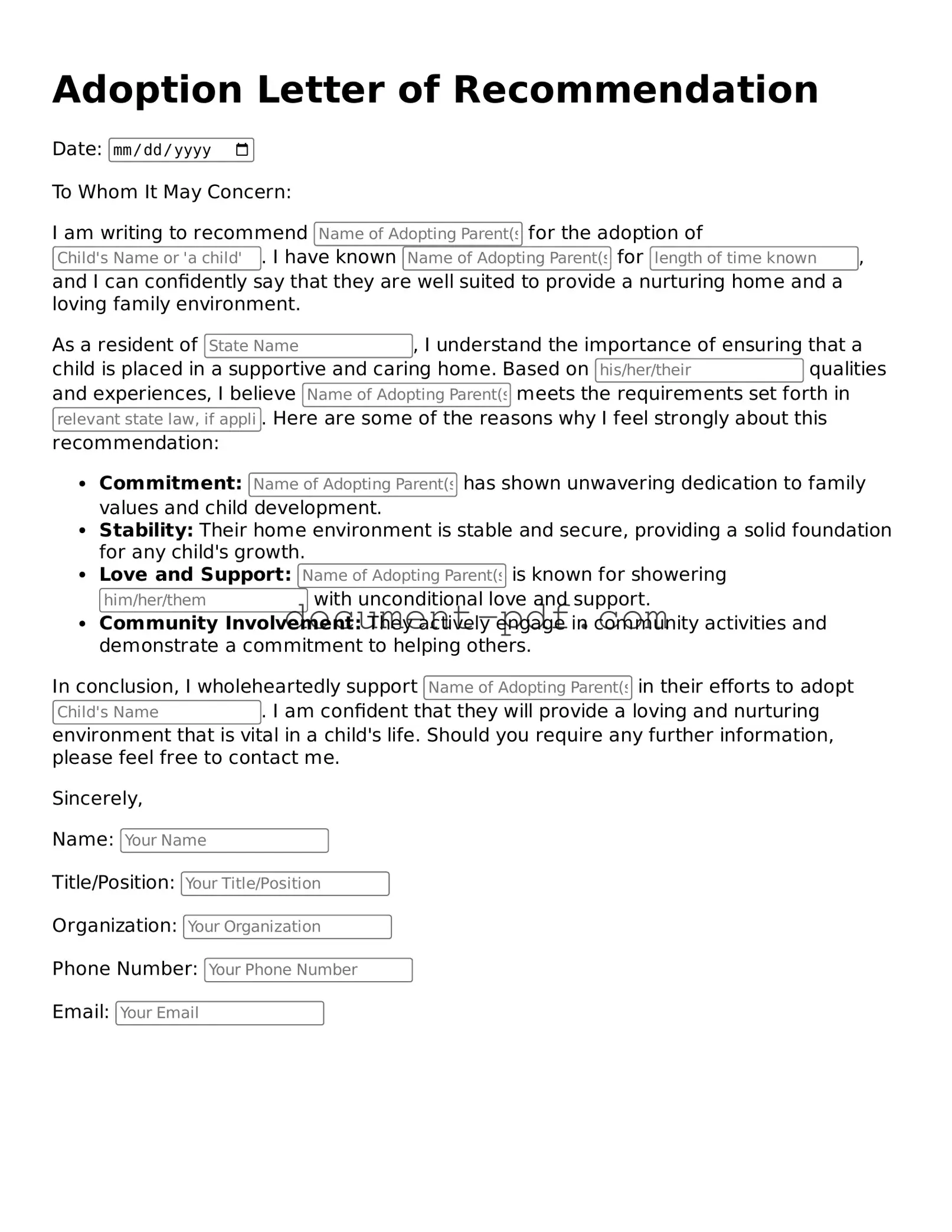The Adoption Letter of Recommendation form is similar to a Character Reference Letter. Both documents serve to provide insight into an individual's character and suitability for a specific role or situation. In the context of adoption, a character reference letter may be written by friends, family, or colleagues who can vouch for the prospective adoptive parents. This letter typically highlights personal qualities such as kindness, stability, and nurturing abilities, which are essential traits for anyone considering adoption.
Another document akin to the Adoption Letter of Recommendation is the Foster Care Reference Letter. This letter is often required for individuals seeking to become foster parents. It serves a similar purpose by providing an evaluation of the applicant's ability to care for children. Foster care reference letters typically include information about the applicant's home environment, parenting style, and commitment to providing a safe and loving space for children in need.
The Home Study Report is another document that shares similarities with the Adoption Letter of Recommendation. While the home study is a more comprehensive evaluation, it includes recommendations from social workers or professionals who assess the suitability of the home for a child. The report takes into account the family's dynamics, living conditions, and emotional readiness to adopt, much like the recommendation letter focuses on personal qualities and readiness for adoption.
A Letter of Intent can also be compared to the Adoption Letter of Recommendation. This document outlines a prospective adoptive parent's intentions and motivations for adopting a child. It often includes personal stories and aspirations for the child's future. Like the recommendation letter, it aims to provide insight into the applicant's character and commitment to parenting.
Additionally, the Personal Statement is similar in that it allows prospective adoptive parents to express their feelings, beliefs, and motivations regarding adoption. This document often accompanies other forms and provides a deeper understanding of the applicant's journey and readiness to welcome a child into their family. It serves to humanize the adoption process, much like the recommendation letter does.
Another relevant document is the Employment Verification Letter. While not directly related to adoption, it can be important in the overall evaluation process. This letter confirms the applicant's employment status and financial stability, which are crucial factors when assessing their ability to provide for a child. It complements the recommendation letter by providing a broader picture of the applicant's life circumstances.
The Medical Clearance Letter also shares similarities with the Adoption Letter of Recommendation. This document confirms that the prospective adoptive parents are in good health and capable of caring for a child. It reassures adoption agencies and birth parents that the applicants can provide a safe and healthy environment, paralleling the assurance provided by a recommendation letter regarding the applicants' character.
In the same vein, a Criminal Background Check can be viewed as a document related to the Adoption Letter of Recommendation. While the recommendation letter focuses on personal qualities, the background check provides a factual account of the applicants' legal history. This information is essential for ensuring the safety and well-being of the child being adopted, complementing the subjective insights offered in a recommendation letter.
For those navigating custody matters, a practical Character Reference Letter for Child Custody template can be instrumental in underscoring a parent's suitability and engagement in the child's life. This document not only supports the parent’s case but also facilitates a clearer understanding of their parenting strengths and relationships with the child, which can be crucial during custody evaluations.
Lastly, the Social Worker’s Assessment Report is another document that aligns with the Adoption Letter of Recommendation. This report is generated by a social worker who evaluates the family's readiness for adoption. It includes observations and recommendations based on interviews and home visits. Like the recommendation letter, it aims to provide an informed perspective on the family's suitability for adopting a child.

